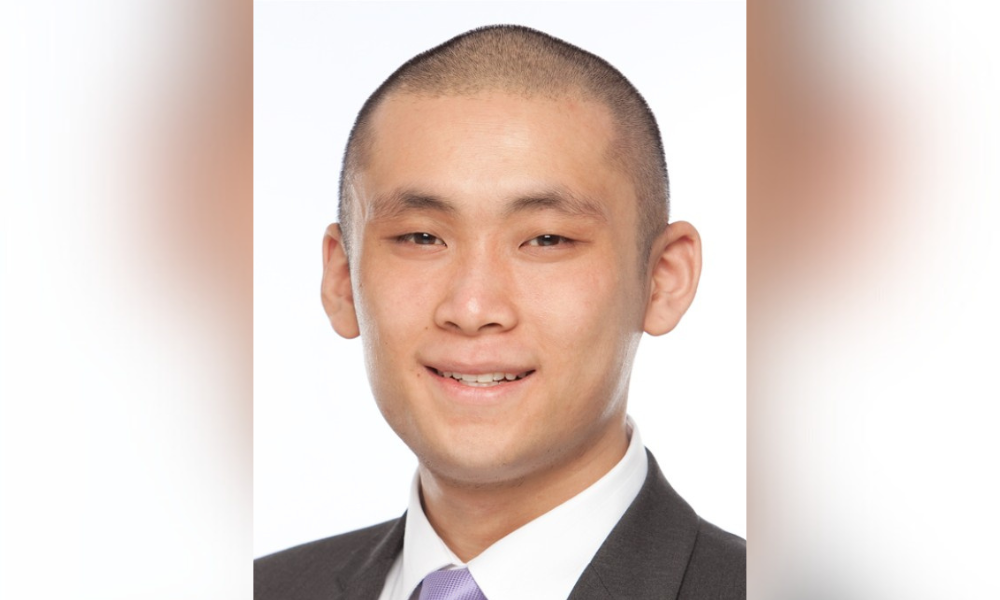Douglas Chen didn’t set out to be the only lawyer at one of Canada’s largest privately-owned real estate companies – but that’s exactly where he’s landed, and it’s a role that demands both versatility and decisiveness. Since joining Baz Group of Companies (Baz) in January 2022, he has navigated legal matters that span across development, multi-family operations, retirement communities, and property management in seven North American markets.
While his title has changed over the years, the essence of his responsibilities remains constant: overseeing the legal operations of the company and its affiliates. He describes Baz as a real estate investment company made up of diverse real estate verticals. What began as Marlin Spring, a residential development company, has since expanded into multi-family housing in Canada and the US, and a seniors’ living platform called Spring Living.
Before Baz, Chen built his legal foundation in private practice, focusing on commercial real estate law. But it was his move to Restaurant Brands International (RBI) – the parent company of Tim Hortons, Burger King, and Popeyes – that first exposed him to the inner workings of a corporate legal team. At RBI, he handled real estate and franchise law, but over time, he found himself missing the complexity of development transactions. The role at Baz “felt like it was the right opportunity to get back closer to what I had been doing more so when I was in private practice,” he says.
The new role required him to jump into a business environment that moves fast, touches many sectors, and demands legal fluency across disciplines. And with no other in-house lawyers to lean on, Chen had to broaden his legal bandwidth quickly. “As general counsel now... I’m involved in human resources conversations... even our service contracts, with... computer providers, photocopy providers,” he explains.
It’s not just about breadth – it’s about judgment. One of the critical skills he’s had to hone is legal triage: deciding which matters can be handled internally and which require external expertise. He evaluates each issue by its complexity and risk profile. “There are two aspects to the risk. One is, what’s the magnitude of the risk itself, and then what’s the likelihood of something bad coming out of it,” he says. Low-risk, high-volume matters like NDAs and non-binding term sheets usually stay in-house. When a statement of claim lands on his desk, it goes straight to external counsel.
Chen emphasizes that reflexively outsourcing every legal issue isn’t practical – or smart. “Dealing with it internally actually gives an opportunity for us to de-escalate things,” he explains. Sometimes a dispute that begins with a demand letter can be resolved through a simple conversation. But once external lawyers get involved, the situation can become entrenched, more adversarial, and costly.
His approach to legal work is shaped not just by what’s legally sound but also by what’s commercially reasonable. “A lot of issues... start off with legal issues, but they end up really being legal adjacent,” he says. Whether it's a disagreement with a service provider or the intricacies of procurement contracts, Chen often finds himself balancing the law with business practicality.
That business focus is a major reason he left private practice. “You were very often not part of the bigger business decision,” he says of his early law firm experience. “To me that just... was something that I wanted to explore a bit more.” With a background in business as well as law, he wanted a seat at the strategy table, not just a role in papering deals.
Being embedded in the business also gives Chen a better sense of timing and urgency when working with external law firms. “There are certainly going to be times where we need to act fast... but that shouldn’t be the baseline,” he says. Setting false deadlines or creating unnecessary urgency, in his view, damages long-term working relationships.
Baz isn’t a startup, but it’s a relatively young company – founded around 2013 – and its legal function is still developing. There was one in-house lawyer before Chen, but the role had been vacant for some time before he joined. As the business matured, the need for internal legal support became more pressing. “As is common... you have the core business team, and you rely on an external counsel,” he says. “And then slowly as the company grows, there’s more need for internal governance, internal support.”
That growth has come with regulatory implications. The various business units of Baz (and/or its affiliates) interact with several regulators, including the Home Construction Regulatory Authority and Tarion for its development business, and the Retirement Homes Regulatory Authority for its seniors’ platform. In Quebec, Chen supports the business teams’ work with the CIUSSS, the province’s health and social services body, for retirement home compliance.
On top of that, market forces can rapidly shift Baz’s strategic priorities. “There’s general... macroeconomic things,” he says, referencing elections, interest rates, and employment data. The company also keeps a close watch on public policy, particularly in areas that affect housing supply and affordability.
For young lawyers considering the in-house path, Chen believes curiosity is a better indicator than credentials. “If you are a lawyer that is inquisitive about your client and how they operate, that would be an indication that this might be something that’s good for you,” he says. He sees in-house counsel not just as legal gatekeepers but as contributors to a company’s growth and direction.
That contribution, however, requires a shift in mindset. Being the person who simply says no isn’t enough. “It’s easy as a lawyer just to throw up roadblocks,” he says. But when legal advice becomes a barrier rather than a solution, the business suffers. The challenge – and the opportunity – is in finding ways to support the business without compromising on integrity.
And in Chen’s case, doing that alone isn’t a burden – it’s part of the job.





